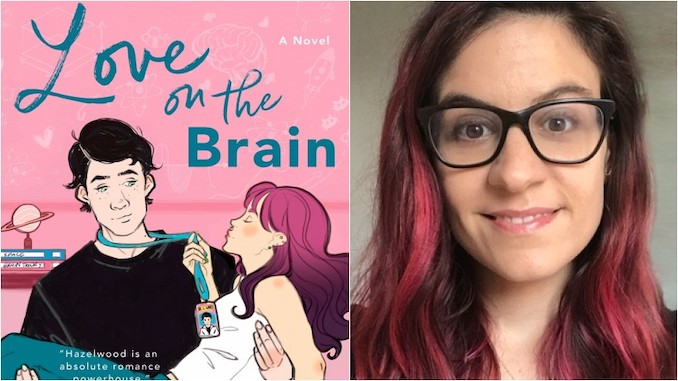Ali Hazelwood Talks Love on the Brain, Feminist Romance, and Her Roots in Fanfic

One of the most satisfying recent trends in publishing is the STEMinist love story—a charming sobriquet for contemporary romances and romantic comedies that feature diverse heroines from diverse, often nontraditional backgrounds working in STEM fields and breaking barriers as easily as they might break hearts.
These kinds of stories are not just about women falling in love, but about tackling any number of timely and relevant issues, from sexism in the workplace to issues of equity and inclusion, and the fact that even today male opinions are often privileged over female voices not because they are right or more experienced, but simply because they are male. Plus, if you’ve ever had a weakness for nerds who get hype about solving problems, this is absolutely 100% the genre for you.
Author Ali Hazelwood has become well known for her STEMist romantic fiction: Her debut The Love Hypothesis is a New York Times bestseller that became a viral sensation on BookTok and her second novel, Love on the Brain seems well on its way to similar success. (Turns out neuroscience is actually really sexy, y’all!)
We got the chance to chat with Hazelwood herself about Love on the Brain, her unique background as an author, her favorite romance trope, and what she’s working on next.
![]()
Paste Magazine: You took such an interesting path to become an author—I know you have a personal background in STEM and were very active in fanfiction communities. Can you tell our readers a little bit about how those things have played into your journey of writing both The Love Hypothesis and Love on the Brain?
Ali Hazelwood: I have taken a lot of inspiration from the settings I find myself in every day, and from my career in academia. I started writing fanfiction when I was in grad school as a way to de-stress, and then ended up writing romance books about people in STEM academia.
Paste: I think fanfiction is honestly an amazing medium and gets such an unfair bad rap from people who don’t value or understand it. Good fanfic is art! How did being a fanfic writer shape the professional writer you became?
I had never written fiction before fanfiction, so everything that I know on writing I’ve learned from fic! To me, it’s an easy way to approach writing for those who aren’t experienced writers, but I understand that some people don’t like it and to each their own!
Paste: One of my favorite things about your books is that they don’t require their heroines to be lesser in any way—Bee is smart, career-focused, ambitious, and successful in the sort of careers we don’t often get the chance to see women excel in on the page. Talk to me about Bee’s character and her journey through this book.
Hazelwood: I think Bee knows what she wants, but she’s had a few hiccups and hasn’t been able to get it quite yet. The book is very much the story of her going after what she wants—and managing to find love in the process.
-

-

-

-

-

-

-

-

-

-

-

-

-

-

-

-

-

-

-

-

-

-

-

-

-

-

-

-

-

-

-

-

-

-

-

-

-

-

-

-








































